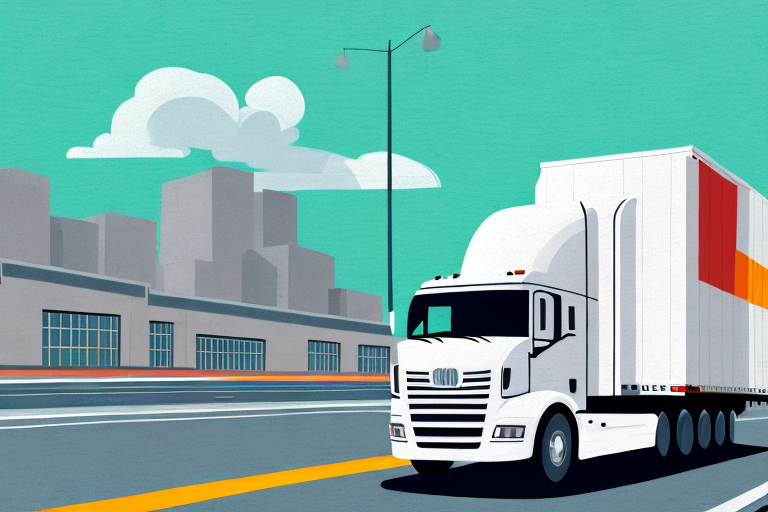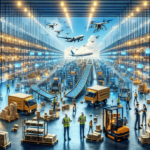The Importance of Efficient Logistics in Today's Business World
Logistics is the process of planning, implementing, and controlling the movement of goods from the point of origin to the point of consumption. It encompasses various activities such as transportation, warehousing, inventory management, order processing, and distribution. Efficient logistics is vital for the success of any business as it ensures timely delivery of goods to customers, reduces transportation costs, and enhances customer satisfaction. Companies with well-structured logistics systems are better equipped to meet customer demands, positively impacting their revenue and reputation.
Enhancing Customer Satisfaction
Timely and accurate deliveries lead to higher customer satisfaction and loyalty. According to a Supply Chain Digital report, 80% of customers consider delivery speed as a crucial factor in their purchasing decisions.
Gaining Competitive Advantage
Efficient logistics provides businesses with a competitive edge by streamlining supply chain processes, reducing lead times, and improving product quality. This allows companies to offer better prices and services, attracting and retaining more customers over time.
Reducing Environmental Impact
Optimizing transportation routes, reducing packaging waste, and using sustainable materials help businesses minimize their carbon footprint. This not only contributes to environmental sustainability but also enhances the company's reputation among customers and stakeholders, fostering brand loyalty and increased sales.
Common Challenges in the Logistics Industry
The logistics sector faces several challenges that can hinder operational efficiency. Addressing these issues is crucial for maintaining smooth operations and achieving business objectives.
Lack of Supply Chain Visibility
Limited visibility in the supply chain makes it difficult to track goods from origin to destination, often resulting in late deliveries and customer dissatisfaction.
Rising Transportation Costs
Increasing fuel prices and infrastructural constraints are driving up transportation costs, making it more expensive to move goods efficiently.
Workforce Shortages
The logistics industry is experiencing a shortage of skilled workers, including drivers and warehouse personnel. This scarcity affects operational efficiency and increases labor costs.
Adoption of Sustainable Practices
There is growing pressure for logistics companies to adopt sustainable practices, which requires significant investments in technology and infrastructure—a challenge, especially for smaller firms.
Technological Advancements in Logistics
Technology plays a pivotal role in transforming the logistics industry. Innovations such as IoT devices, automation tools, and cloud-based solutions are enabling real-time visibility and control over supply chains.
Real-Time Tracking with IoT and Automation
IoT devices and automation tools facilitate the real-time tracking of shipments through GPS and RFID technologies. This not only helps prevent theft and damage but also improves delivery accuracy and customer service.
Warehouse Management Technologies
Automated systems like conveyor belts and robotic pickers streamline warehouse operations, reducing human error and increasing efficiency. According to a Warehouse News study, automation can increase productivity by up to 30%.
Transportation Management Systems (TMS)
TMS software optimizes route planning, carrier selection, and shipment tracking. This leads to significant cost savings and improved delivery times by automating and streamlining transportation processes.
Strategies for Optimizing Logistics Operations
Implementing effective strategies is essential for optimizing logistics operations. These strategies focus on improving supply chain management, inventory control, and transportation efficiency.
Streamlining Supply Chain Management
Coordinating activities among suppliers, manufacturers, distributors, and retailers ensures efficient operations. Integrating digital platforms facilitates information exchange, enhancing overall supply chain effectiveness.
Improving Inventory Management
- Data Analytics: Utilizing data to forecast demand and optimize inventory levels.
- Automation Tools: Implementing RFID tagging and barcode scanning to reduce errors.
- Just-In-Time (JIT) Systems: Ordering inventory only as needed to reduce carrying costs.
Optimizing Transportation and Distribution
Efficient transportation and distribution channels are crucial for cost savings and operational efficiency. Employing route optimization tools and selecting appropriate carriers can enhance performance.
Effective Last-Mile Delivery
Last-mile delivery poses unique challenges, including delivery delays and increased costs. Leveraging technology solutions like route optimization and offering flexible delivery options can mitigate these issues and improve customer satisfaction.
Sustainability and Environmental Impact
As environmental concerns grow, the logistics industry must adopt sustainable practices to reduce its carbon footprint and promote eco-friendly operations.
Green Transportation Modes
Utilizing electric vehicles and alternative fuels can significantly decrease emissions from transportation activities.
Energy-Efficient Warehouses
Implementing energy-saving technologies, such as LED lighting and automated climate control systems, can reduce energy consumption in warehouses.
Eco-Friendly Packaging Solutions
Reducing packaging materials and using recyclable or biodegradable packaging helps minimize waste and environmental impact.
Future Trends and Innovations in the Logistics Industry
The logistics sector is continuously evolving, with emerging technologies and innovations shaping its future growth and development.
Blockchain and Autonomous Vehicles
Blockchain technology can enhance transparency and security in supply chains, while autonomous vehicles promise to revolutionize transportation by increasing efficiency and reducing labor costs.
Robotics and Automation
Advanced robotics are automating various aspects of logistics, from sorting and packing to transportation within warehouses, thereby boosting productivity.
Data Analytics and AI
Artificial Intelligence (AI) and data analytics enable logistics companies to make informed decisions by analyzing vast amounts of data, improving demand forecasting, and optimizing operations.
In conclusion, the logistics industry faces numerous challenges that require strategic solutions to ensure optimal operations. By embracing technology, streamlining supply chain management, adopting sustainable practices, and fostering collaborative relationships with partners and suppliers, logistics companies can overcome these obstacles and enhance their efficiency. Staying abreast of emerging trends and innovations is essential for maintaining a competitive edge and achieving long-term success.




















